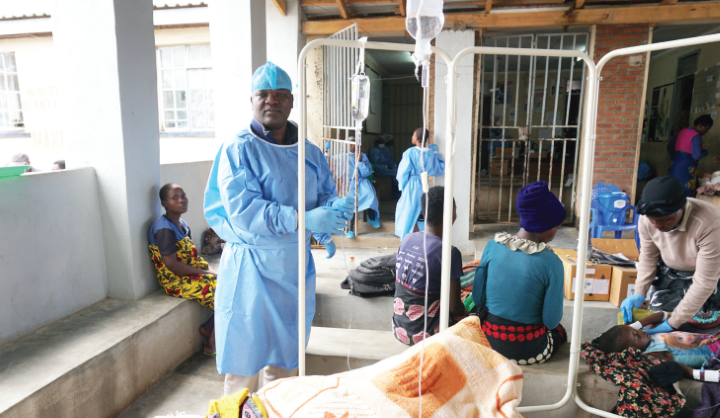Mental illness is no barrier
Blessings Chipeta wants you to know that it is exhausting to fight a war inside your head every day, but you cannot catch mental illness by being kind.
“Mental illness is like malaria or any other disease. If you seek treatment on time, it’s not the end of life,” says the 27-year-old, from Ekwendeni in Mzimba.

In the past decade, Blessings has twice sought treatment for the condition many suffer in seclusion as onlookers frown at them.
However, he put up a fierce fight-back. In 2013, after spending half a semester at St John the Baptist’s DMI University in Mangochi, Chipeta scooped 10 points in Malawi School Certificate of Education (MSCE) having sat the examinations a year after his second stint in a mental hospital.
This is just four points short of the best score geniuses gets, yet it is much better than what he scored in 2009 before he first suffered mental illness.
His supportive mother, Ellen Chirambo, says: “The mental illness started after he completed Form Four at Euthini Secondary School in Mzimba where he scored 17 points. It began like cerebral malaria and we took him for prayers, but things got worse.
“In the middle of the night, we rushed to Ekwendeni Mission Hospital and a clinician referred him to Mzuzu Central Hospital. In Mzuzu, a doctor sent him to St John of God. Blessings was admitted to the mental hospital for a month. After a week, we noticed a great improvement.”
After psychiatric treatment, Blessings walked home mentally sound and re-enrolled in Form Three at Ledoma Private Secondary School in Ekwendeni.
“He was okay, but the mental illness started again when he was in Form Four. We took him to St John of God,” says the soft-spoken mother.
Blessings spent a year out of school, but he fought back sturdily. Chirambo says he has been in a stable state since December 2017.
“Blessings is a good boy. He is no longer forgetful. He is very helpful to us, hardworking, obedient and cheerful. He takes his drugs very well,” she explains.
Blessings says the illness does not define him. His self-esteem is steaming and becomes unmistakable as he explains why he decided to retake MSCE?
He narrates: “When I wasn’t reading much, I got 17 points and I performed well in sciences. This encouraged me. ‘What if I study hard?’ My IQ was not affected by the mental illness. So, I assured myself that if I take the drugs without defaulting, I wanna make it. My condition was a barrier.”
His self-belief paid off. His MSCE glitters with distinctions — ones in mathematics, biology and physical science; twos in geography and history; and threes in English and computer science.
“If you accept your condition, you will excel in life,” he explains, flaunting the certificate.
Blessings wants to become a doctor so that he can help lessen the suffering of patients with both bodily and mental disorders.
He salutes his supportive parents for his triumph which illustrates that no matter how hard the past, one can always begin again.
He asserts: “There is life after mental illness. If you and the people around you accept that mental illness is a health condition like any other, it becomes easy to take medication. Do not stop taking medicine.”
But he warns people on mental health treatment against alcohol and drug abuse, likening it to trying to fill a leaky bucket.
Blessings and his mother back Ombudsman Martha Chizuma’s call for the Health Education Unit at the Ministry of Health to ensure everyone is aware that mental conditions are like malaria, cancer and cholera—curable if one gets treatment on time.
“There is need for counselling and sensitisation. Go to rural areas and help people understand why they need to seek treatment, where they can get assistance, how to take medicine, how to support us and that you can’t catch mental illness by being kind,” he implores.
A study by nursing students at St John of God Hospitaller Services shows half of persons with mental health cases in Mzimba go untreated due to a culture indifference and discrimination.
Blessings’ mother says mental illness and disorder affect family members, including parents, siblings and spouses.
“We need to stay strong. Family members with mental conditions are human beings like you and I. Give them support, encouragement and care. Mental illness is nothing to be ashamed of,” she says.





